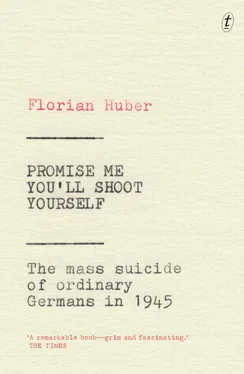The river was no comfort. Complicity, culpability, guilt—the Theinerts had no need to say the words aloud as they reached their unanimous verdict. If the war was lost, they would suffer the victors’ revenge. Johannes Theinert was a teacher in a Nazi establishment; he knew they’d come for him. But the couple ruled out leaving their town by the river, their home. ‘Life would have no meaning for us if we did that,’ Hildegard explained. They took a silent decision to which they saw no alternative. ‘We would go to our deaths together.’
They began to take leave of all that was dear to them—the town and its inhabitants, their house, the river. It was a long farewell that went on for three weeks. Then, on 9 May 1945, after six years of war, they heard news of the capitulation. It was a beautiful, balmy day; a soft breeze seemed to be coaxing people out into the fresh air.
For the first time, it is the teacher’s wife, Hildegard, who sits down at the desk to write the diary. ‘Glittering and colourful, the Neisse flows past our hometown, serene and so familiar. The rays of the afternoon sun reflect in its rippling waters.’ She tries to capture the mood in their house—and her own mood. She knows it will be the final entry. ‘I have said a last farewell to our flat. It has given us so many hours of happiness.’ For almost the entire war, they had thought it impossible that things should end this way. They had kept on hoping, believing, dreaming. ‘How lovely the future could be, if only—yes, if only—grim reality hadn’t destroyed all our dreams of life after the war. One last long look across at the town, up at the fortress.’
Their dreams were the dreams of many millions of Germans. They had all preferred to ignore grim reality, but it could no longer be denied—it was upon them now, harsh and noisy and triumphant. The time had come, Frau Theinert wrote:
The Russians are in town. We have just heard that Dr Nebler killed his wife and daughters and then himself. A local landlord has hanged his young wife. This kind of thing is happening more and more.
Fear, contagion, a sense of urgency. The Theinerts were not the only ones who had given up hope. Suicide was suddenly rife in the streets and houses of the small town. During these moments of drama, the teacher’s wife withdrew to her desk and wrote these final lines in her diary—as if to pause time, to stop it moving forwards. ‘Only a little while longer, then it will all be over, forever!’
They must have agreed on a time. When it came, Johannes Theinert took his gun and shot Hildegard and then himself. Their diary was found in the house, beside their dead bodies. The last entry was complete, right up to the moment of their deaths. ‘Who will think of us, who will know how we ended? Do my words have any meaning?’
In January 1945, the 1st Belorussian Front had advanced to the west bank of the Oder at Küstrin and Frankfurt and established two bridgeheads. Nazi authorities declared Frankfurt an der Oder a stronghold, and the commanding officer evacuated parts of the town and prepared it for defence. Another two months would elapse, however, before the Soviets attacked. During this time, between late January and early April 1945, the German police investigated more than sixty suicides. In early February, a retired major general had turned a gun on himself after leaving a tersely worded suicide note: ‘I have shot myself so as not to be a burden to my household.’ Other cases included joint or group suicides involving everyone within a household; in early March, for instance, a widow and her companion poisoned themselves in their kitchen with coal gas in anticipation of the forced evacuation of their flat.
These deaths were a prelude to the second big wave of suicides that would spread across the German territories west of the Oder-Neisse line at the beginning of the Red Army’s Berlin offensive. Nowhere do the later accounts reach such a pitch of intensity as in Western Pomerania and Mecklenburg, where events were often reconstructed by survivors, partly from their own memories, partly from the gradually emerging stories of their friends and relations.
Norbert Buske, the vicar’s son from Demmin, witnessed the Soviet invasion with his mother and brother; he saw the destruction of the town and the mass suicide of its inhabitants, and watched the people with bandaged wrists queuing outside the makeshift doctor’s surgery in the room where confirmation classes were held. Week after week, he heard the names of the dead being read out in church, a list that seemed to go on for longer than the service itself. Decades later, he would compile the reports of the deaths of his friends and family and other townspeople as a way of taking stock of those dreadful days. The contours of the disaster were finally becoming clear, and it emerged that the pattern of events had, with slight variations, been repeated many times throughout the region. What went on between 28 April and 3 May 1945 in Demmin, where there were an estimated seven hundred to a thousand suicides, had also happened in countless other places, from Stettin to Rostock.
Take, for instance, the small town of Friedland on the Mecklenburg Lake Plateau, a stop on the westward route of the 2nd Belorussian Front. On 27 April, the Wehrmacht began to evacuate the military hospitals there. The Volkssturm soldiers who were charged with defending the town were caught up in the general panic of retreat, along with many townspeople and refugees. When the first Soviet soldiers reconnoitred on foot the next evening, a police superintendent shot two of them before going on to kill himself. He had already killed his family. The German troops retreated from Friedland before further fighting could break out. After the Soviet invasion, most of the town burnt down. Various sources indicate that more than five hundred people killed themselves, including several families.
In the former duchy capital of Neustrelitz, a medium-sized town in southern Mecklenburg, the parish registers and cemetery records document the suicides of just under three hundred adults at the time of the Red Army invasion—by hanging, poisoning, shooting, drowning, wrist-slashing. At least eighty children and adolescents died with them. In one building, ten people hanged themselves: a locksmith and his wife, the three members of a barber’s family, a cobbler together with his son and mother, and a teacher and his wife. For days, the living had to heave the dead up cellar stairs, drag them down from attics, or fish them out of lakes and other bodies of water.
Neubrandenburg hardly put up a fight when it was captured on 29 April, and soon the town was on fire. Hundreds of people chose to die. ‘I remember opening a door and finding a large family seated around a table,’ one woman said many years later. ‘They had clearly celebrated the last day of their lives and then poisoned themselves. They were all dead.’
Even in the more remote villages and hamlets, there was no escape from the shock waves caused by Germany’s downfall. A few days after the war ended, a vicar’s wife from the parish of Ducherow, near Anklam, described the events of that time in a kind of journal. Maria Meinhof addressed her ‘diary of tough times’ to her eight children, without knowing how many of them were still alive. All six of her sons were away at the front, and she wanted those who returned to be able to read about what had happened in their absence. ‘As I record these events, I think of each one of you, as if I were writing you a letter. I wonder whether you’ll ever hold this little book in your hands?’ Writing the diary made her feel closer to her children.
Maria Meinhof’s seventy-five-page account of the end of the war is written in a neat hand. She begins by describing the flood of refugees and how, for months, the vicarage had been transformed into an emergency shelter, housing up to forty people—but she soon moves on, anxious to write about the days when the world as she knew it came to an end. The first bombs fell on 28 April. There were dead German soldiers, Soviet panzer spearheads. That night, the suffering that had already been visited on so many other places reached Ducherow. Women in headscarves forced into corners. Probing torchlight, threats made at gunpoint. The tramp of soldiers’ boots. Young women dragged into empty rooms. Sixty-year-old Maria Meinhof managed to fight off a soldier who tried to thrust himself on her. It was the most awful night of her life. The next day, the world seemed in disarray: ‘Sunday dawned, but we didn’t notice it was Sunday. There was no question of going to church.’
Читать дальше












